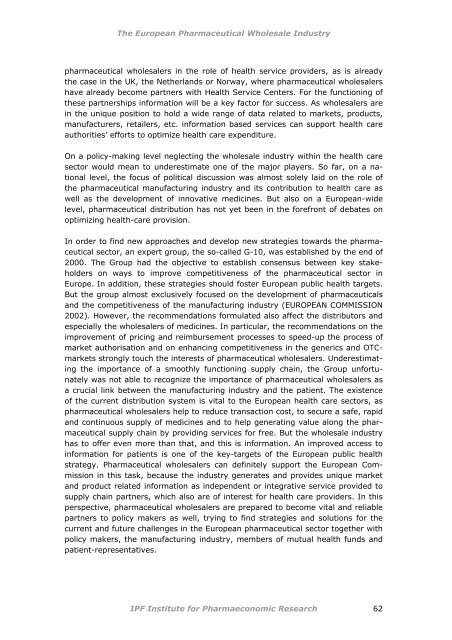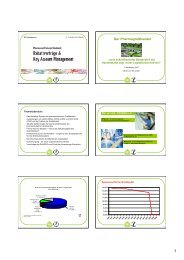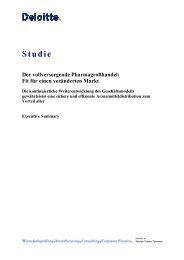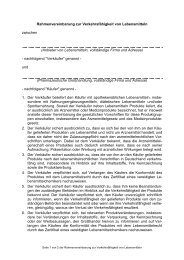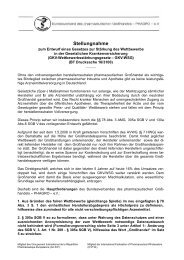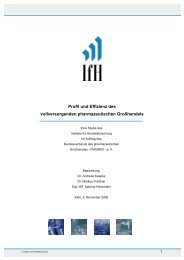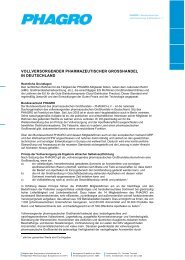The European Pharmaceutical Wholesale Industry: - phagro
The European Pharmaceutical Wholesale Industry: - phagro
The European Pharmaceutical Wholesale Industry: - phagro
Create successful ePaper yourself
Turn your PDF publications into a flip-book with our unique Google optimized e-Paper software.
<strong>The</strong> <strong>European</strong> <strong>Pharmaceutical</strong> <strong>Wholesale</strong> <strong>Industry</strong><br />
pharmaceutical wholesalers in the role of health service providers, as is already<br />
the case in the UK, the Netherlands or Norway, where pharmaceutical wholesalers<br />
have already become partners with Health Service Centers. For the functioning of<br />
these partnerships information will be a key factor for success. As wholesalers are<br />
in the unique position to hold a wide range of data related to markets, products,<br />
manufacturers, retailers, etc. information based services can support health care<br />
authorities’ efforts to optimize health care expenditure.<br />
On a policy-making level neglecting the wholesale industry within the health care<br />
sector would mean to underestimate one of the major players. So far, on a national<br />
level, the focus of political discussion was almost solely laid on the role of<br />
the pharmaceutical manufacturing industry and its contribution to health care as<br />
well as the development of innovative medicines. But also on a <strong>European</strong>-wide<br />
level, pharmaceutical distribution has not yet been in the forefront of debates on<br />
optimizing health-care provision.<br />
In order to find new approaches and develop new strategies towards the pharmaceutical<br />
sector, an expert group, the so-called G-10, was established by the end of<br />
2000. <strong>The</strong> Group had the objective to establish consensus between key stakeholders<br />
on ways to improve competitiveness of the pharmaceutical sector in<br />
Europe. In addition, these strategies should foster <strong>European</strong> public health targets.<br />
But the group almost exclusively focused on the development of pharmaceuticals<br />
and the competitiveness of the manufacturing industry (EUROPEAN COMMISSION<br />
2002). However, the recommendations formulated also affect the distributors and<br />
especially the wholesalers of medicines. In particular, the recommendations on the<br />
improvement of pricing and reimbursement processes to speed-up the process of<br />
market authorisation and on enhancing competitiveness in the generics and OTCmarkets<br />
strongly touch the interests of pharmaceutical wholesalers. Underestimating<br />
the importance of a smoothly functioning supply chain, the Group unfortunately<br />
was not able to recognize the importance of pharmaceutical wholesalers as<br />
a crucial link between the manufacturing industry and the patient. <strong>The</strong> existence<br />
of the current distribution system is vital to the <strong>European</strong> health care sectors, as<br />
pharmaceutical wholesalers help to reduce transaction cost, to secure a safe, rapid<br />
and continuous supply of medicines and to help generating value along the pharmaceutical<br />
supply chain by providing services for free. But the wholesale industry<br />
has to offer even more than that, and this is information. An improved access to<br />
information for patients is one of the key-targets of the <strong>European</strong> public health<br />
strategy. <strong>Pharmaceutical</strong> wholesalers can definitely support the <strong>European</strong> Commission<br />
in this task, because the industry generates and provides unique market<br />
and product related information as independent or integrative service provided to<br />
supply chain partners, which also are of interest for health care providers. In this<br />
perspective, pharmaceutical wholesalers are prepared to become vital and reliable<br />
partners to policy makers as well, trying to find strategies and solutions for the<br />
current and future challenges in the <strong>European</strong> pharmaceutical sector together with<br />
policy makers, the manufacturing industry, members of mutual health funds and<br />
patient-representatives.<br />
IPF Institute for Pharmaeconomic Research 62


